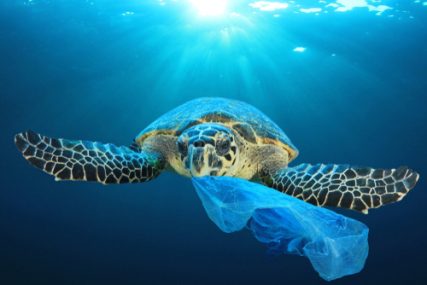The Ocean Plastic Epidemic

We consider ourselves incredibly lucky at Dive Butler. We get the opportunity to go and scout gorgeous, undiscovered dive locations in the far corners of the globe in our quest to prepare incredible itineraries for our guests and their superyachts. We dive into some of the most beautiful and far-flung oceans, we spend time with local communities enjoying the simplicity of their lifestyle, and we come face-to-face with the majestic creatures that exist below the surface. Yet every single time we are saddened by the amount of plastic washed ashore on a picturesque, deserted island, or by the floating plastic bags full of rubbish, which have been dumped into the ocean miles away.
Just recently, a sperm whale washed ashore in southeast Spain. Inside the young whale’s stomach were 64 pounds of trash. A horrifying collection of plastic bags, ropes, netting, and even a plastic drum had clogged its intestines and stomach, ultimately killing it. This story is shocking and heart-breaking. Yet sadly, it is not uncommon.
If 20 years ago the sight of floating rubbish was not so common, today it is increasingly prevalent. Beaches littered with plastic are becoming the norm. However, the real problem lies not on the beaches, but in the open ocean, where entire floating islands of plastic the size of France exists. The ocean plastic epidemic is here.
The Harsh Reality of the Ocean Plastic Problem
The facts are sobering. Every single minute, one rubbish truck’s worth of plastic is dumped into the ocean. That’s 1.4 billion pounds of rubbish, and much of it is plastic. 50% is single-use. There is more microplastic in the ocean than there are stars in the Milky Way. And the amount of plastic in the ocean is set to increase tenfold by 2020 so that by 2050 there will be more plastic than fish (by weight) in our beautiful oceans. In short, plastic makes up approximately 90% of all rubbish floating on the ocean’s surface, with 46,000 pieces of plastic per square mile. As it takes 500 to 1,000 years for plastic to degrade, the problem will only get worse.
All this plastic clogging the oceans has detrimental effects on the marine life within it. As many creatures can’t distinguish between food and plastic, they eat it and their stomachs fill, preventing them from eating real food. They ultimately starve to death. One million seabirds and 100,000 marine mammals are killed each year from plastic in our oceans. Studies have shown turtles living in proximity to the Great Pacific Garbage Patch have up to 74% of their diets composed of plastic. Coral reefs, home to over 25% of marine life, also suffer from plastic pollution as their chances of becoming diseased rises from 4% to 89% after coming into contact with ocean plastic.
In addition to mammals and birds, fish are consuming microplastics, which we in turn eat. The effect on our own health of these toxic microplastics is yet to be fully understood, but research conducted by scientists at Ghent University in Belgium suggests that seafood eaters are consuming up to 11,000 plastic fragments each year.
How Can We All Help Stop the Ocean Plastic Epidemic?
The picture looks bleak. Yet conservationists believe that if we act now there is still time to drag our massive, vibrant oceans back from the brink of devastation. And with them, the future of the planet.
The single most impactful and obvious way is to minimise our usage of plastics. Here at Dive Butler, we strive for zero waste, and reducing demand for single-use plastic is the easiest step everyone can take to achieve this. As Giovanna, one of our marine biologists and Dive Butler taught us many years ago when ordering a drink, simply say no to the straw. Today, Giovanna’s six-year-old son, as well as the rest of the team, follow her example.
It is a simple first step but leads us to question whether we truly need plastic-wrapped items, plastic bottles or plastic packaging. Switching to reusable shopping bags, metal or glass drinking bottles, and carrying your own reusable take-away coffee mug is easy to do. It is the beginning of a new plastic-free lifestyle.
It is important to spread the word about ocean plastic, as awareness breeds action. Offering alternative solutions to plastic is always more effective than chastising those who may not yet have learned about the detrimental effects our throw-away lifestyle is having on our planet. Only if we work together can we bring the oceans back from devastation. As the famous saying reminds us: we don’t inherit this earth from our ancestors; we borrow it from our grandchildren.
« Diving in the Galápagos Islands | Diving in a Kaleidoscope of Colour in Raja Ampat, Indonesia » |